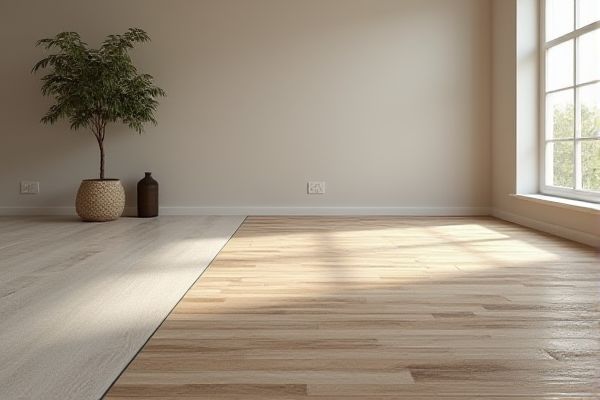
Floating floors offer easy installation and excellent moisture resistance, making them ideal for basement environments, while glue-down floors provide a more solid feel and enhanced durability by securing the planks directly to the subfloor. Discover which flooring option suits your basement needs best by exploring the full comparison in the article ahead.
Table of Comparison
| Feature | Floating Floor | Glue-Down Floor |
|---|---|---|
| Installation | Easy, clicks together, no adhesive needed | Requires adhesive, professional installation recommended |
| Moisture Resistance | Moderate, needs moisture barrier | High, strong bond reduces moisture intrusion |
| Durability | Good, but can shift or squeak over time | Excellent, firmly attached to subfloor |
| Cost | Lower material and labor costs | Higher due to glue and labor |
| Comfort & Sound | Better sound absorption, slight cushioning | Less cushioning, can be noisier |
| Repair & Replacement | Easy to replace individual boards | Harder to repair, requires removing glued sections |
| Ideal Basement Conditions | Dry basements with moisture barrier | Basements with occasional moisture, strong subfloor |
Introduction to Basement Flooring Options
Basement flooring options include floating floors and glue-down floors, each offering distinct advantages depending on moisture levels and installation preferences. Floating floors, often engineered wood or laminate, provide easy installation over subfloors with gaps for expansion, ideal for basements with slight moisture concerns. Glue-down floors, typically vinyl or engineered hardwood, create a more permanent, moisture-resistant bond directly to the substrate, enhancing durability in wetter basement environments for Your long-term use.
Understanding Floating Floors
Floating floors in basements consist of planks or tiles that interlock and rest on a foam or cork underlayment without being attached to the subfloor. This installation method allows for natural expansion and contraction due to temperature and humidity changes, making it ideal for basement environments prone to moisture. Unlike glue-down floors, floating floors offer easier installation, cost-effectiveness, and the ability to replace damaged sections without extensive repairs.
What Are Glue-Down Floors?
Glue-down floors are flooring materials adhered directly to the subfloor using strong adhesives, providing a stable and permanent installation ideal for basements with concrete slabs. This method reduces the risk of moisture infiltration and minimizes floor movement compared to floating floors, which rest above the subfloor without being glued. Commonly used for engineered hardwood and luxury vinyl plank flooring, glue-down installations improve durability and sound insulation in basement environments.
Moisture Resistance Comparison
Floating floors offer superior moisture resistance in basements as they are installed above a subfloor, allowing for better air circulation and reducing the risk of mold and mildew. Glue-down floors, while providing a solid, stable surface, can trap moisture underneath, potentially leading to adhesive failure and floor damage. Your best choice depends on the basement's moisture levels and if adequate waterproofing measures are in place.
Installation Process: Floating vs. Glue-Down
Floating floors install quickly with interlocking planks that rest above the subfloor, providing easy access for repairs and expansion. Glue-down floors require adhesive applied directly to the concrete basement slab, demanding precise moisture testing and meticulous surface preparation. Your choice depends on the balance between installation time and long-term stability against basement moisture conditions.
Durability and Longevity in Basements
Floating floors in basements offer flexibility and ease of installation but may be prone to moisture-related issues, potentially reducing durability. Glue-down floors create a strong, moisture-resistant bond with the subfloor, enhancing longevity and preventing warping in damp basement environments. For long-term durability, glue-down floors typically outperform floating floors in basements due to their superior adhesion and moisture resistance.
Comfort and Sound Insulation Differences
Floating floors in basements offer superior comfort with a slight cushioning effect underfoot and better sound insulation by isolating impact noise, making your living space quieter. Glue-down floors provide a firmer feel but transmit sound more readily due to direct adhesion to the subfloor, resulting in less effective noise dampening. For optimal comfort and sound insulation in a basement environment, floating floors are the preferable choice.
Maintenance Requirements for Each Flooring Type
Floating floors in basements require minimal maintenance, primarily involving regular cleaning and occasional checking for gaps or moisture underlayment, crucial for preventing mold and warping. Glue-down floors demand consistent inspection of adhesive integrity and immediate attention to any bubbling or lifting to avoid costly repairs and maintain the moisture barrier. Proper maintenance extends the lifespan of both flooring types, with floating floors offering easier access for subfloor repairs compared to the more permanent glue-down installation.
Cost Analysis: Floating vs. Glue-Down Flooring
Floating floors generally offer lower installation costs compared to glue-down flooring due to their simpler, faster installation process and minimal need for adhesives. Glue-down flooring typically incurs higher material and labor expenses because of the specialized adhesives and surface preparation required to ensure durability in basement environments. Evaluating your budget and long-term maintenance expenses will help determine the most cost-effective option for your basement flooring project.
Choosing the Best Flooring Method for Your Basement
Floating floors offer easy installation and excellent moisture resistance, making them ideal for basement environments prone to humidity. Glue-down floors provide a durable, stable surface with a strong bond to the subfloor, reducing the risk of shifting and creaking. Selecting the best flooring method depends on your basement's moisture levels, subfloor condition, and desired long-term durability.
 homyna.com
homyna.com